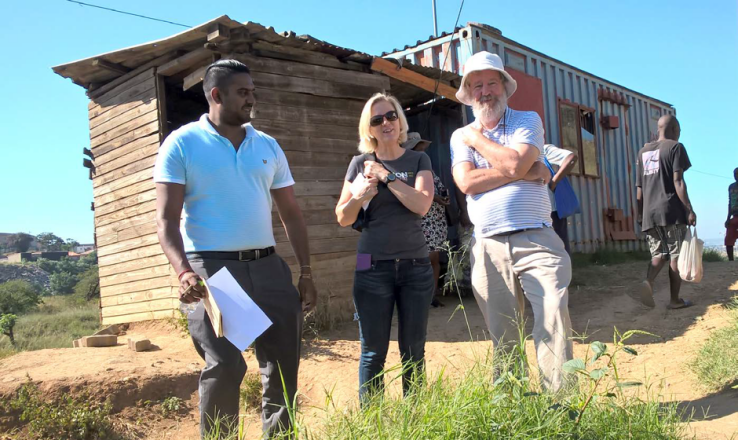2 July 2017 – Mercury Tertiary Times
The Pollution Research Group (PRG) in the University of KwaZulu-Natal’s School of Engineering recently hosted a delegation of the Bill & Melinda Gates Foundation (BMGF) representatives and a select number of their grantees for a visit to kick-start a programme initiated in 2016, which involves the field testing of “Reinvented Toilet” prototypes in Durban.

From left: Dr Sudhir Pillay, Mrs Susan Mercer and Professor Chris Buckley conducting a site visit at an informal settlement in Durban.
The trip involved site visits to the areas earmarked for the proposed tests in eThekwini, status updates from the various partners, a workshop to discuss site selection, grantee needs, local resources and community engagement, as well as visits to local fabricators who could be used to build the systems or components of the systems. The PRG works closely with eThekwini’s Water and Sanitation unit (EWS) in the implementation of research that can improve the water and sanitation services both to the local community and on a global scale. International research partners involved are from Cranfield University in the UK, the Research Triangle Institute (RTI), the University of South Florida, and Janicki Industries - all in the USA. This programme arose from the global recognition of the PRG’s expertise as sanitation practitioners working in the field of faecal sludge management, particularly, through the work of its Head, Professor Chris Buckley, who was one of three experts consulted by the BMGF engaging in direct discussions with Bill Gates in 2009 about the advancement of sanitation solutions for developing countries. BMGF Senior Programme Officer, Dr Carl Hensman, spoke about the selection of Durban as a site to test these prototypes as being in line with its reputation as a city of excellence in sanitation. The hope is that the innovative technologies being piloted could trigger the development of novel business models in dealing with sanitation challenges.
“Chris and the PRG have been one of the strongest partners we’ve had, from understanding the practical process of sanitation to looking at how to implement potential solutions in developing country environments,” said Hensman. “In addition we partner with PRG to help broadcast and educate people with the message that sanitation for everyone is not beyond reach, especially when we adopt a solid scientific understanding, engineered approach, and business reality to the problem.” A central element of the engineering field-testing programme will be knowledge creation, and as such allows for the training of three PhD students and nine Masters students, with the long-term goal of creating a robust talent pipeline to fill the void of expertise in this field. It is anticipated that, by the end of 2017, there will be five reinvented toilet systems in the field at different stages of testing in Durban, providing feedback on how to adapt the designs and engineer the systems for the environment and the end user.